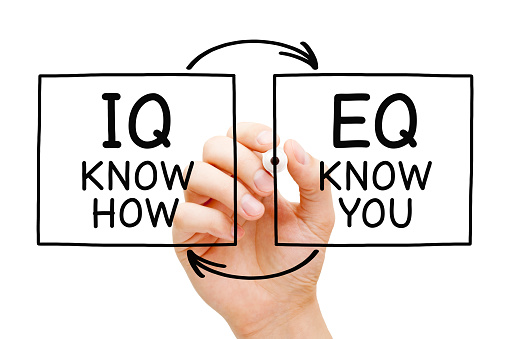Aristotle says “Anyone can become angry—that is easy. But to be angry with the right person, to the right degree, at the right time, for the right purpose, and in the right way—that is not easy.” So, the topic of Emotional Intelligence has been in our world for a very long time. It is only this past few years that people have really been getting serious about becoming more Emotionally Intelligent.
WHAT IS EMOTIONAL INTELLIGENCE?
It is the ability to recognize your own emotions, understand what they’re telling you, and how it will affect people around you. When you understand how others feel, this allows you to manage relationships more effectively. It involves empathy, or the ability to feel the same way someone else is feeling.
WHY IS IT IMPORTANT?
People with high EI are successful in most things they do. Why? Because they’re the ones that others want on their team. When they ask a question, it gets answered. When they need help, they get it. Because they make others feel good, not in the way of buttering them up, they go through life much more easily than people who are easily angered or upset. It’s really your ability to feel feelings, nurture relationships and demonstrate strong character that opens doors in life.
CHARACTERISTICS OF EMOTIONAL INTELLIGENCE
Daniel Goleman in his book “Emotional Intelligence – Why It Can Matter More Than IQ” developed a framework of five elements that define emotional intelligence:
- Self Awareness
- Self Regulation
- Motivation
- Empathy
- Social Skills
The ability to manage people and relationships is very important in all leaders, so developing and using your EI can be a good way to show others the leader inside of you.
HOW AN EMOTIONAL INTELLIGENT PERSON BEHAVE
I. Assertive Communication
When people listen to the word assertive, they think it means be aggressive or dominating, when actually it is the healthiest way of communication. This means presenting your opinion in a strong, confident and respectful manner. It comes in handy in relationships because it allows the couple to be honest and transparent to each other. It requires the knowledge of perception which means you have to understand other people’s world before you speak.
II. Respond and not react
The most common way any person deals with a conflict is a reaction. But when you learn EI, you learn how to respond, which means you understand “The problem is not what they are saying, but what they are not saying”. Every person has a way of masking their real emotions and real feelings because it makes them vulnerable and to hide that they react, get angry so that people run away. They are only left alone and bitter. Instead, understand that “vulnerability is power and it only creates strong bonds”. When a person responds, they understand the deep meaning of a conflict is nothing but a closed communication channel. They know how to open it up!
III. Empathy and Listening
Empathy helps emotionally intelligent people to relate to others on a basic human level. It opens the door for mutual respect and understanding with differing opinions and situations. It is similar on the lines of vulnerability. In conversations, emotionally intelligent people listen for clarity instead of just waiting for their turn to speak. They understand what is being said before responding. This prevents misunderstandings and allows the listener to respond properly and feel respected.
IV. Self-awareness
Self-awareness is where you not only recognize your emotions but also realize how they impact your behaviors. With self-awareness, you become your own inner manager. Instead of being impulsive, you’re able to slow down your reactions and make strategic choices. You also pick up on others’ emotions and body language and use that information to create meaningful conversations and relationships.
V. Motivation
Emotionally intelligent people are highly self-motivated. They set SMART goals and are resilient and flexible in the face of challenges. They know when to improvise and ask for help.
VI. Fun to be around
Emotionally intelligent people are fun to be around because they are the life of party. With such a positive attitude towards life and being full of life, that is hard to ignore them or not smile when they are around. They know how to break your patterns and make you think and learn new things about yourself. They are happy to admit their mistake because for them the relationship is more important than their ego.
Emotional intelligence involves four major skills:
- Ability to perceive emotions.
- To reason with emotions.
- The ability to understand emotions.
- The ability to manage emotions.
It is not difficult to become more emotionally intelligent. The key is in your “intentions”. If you really want to have relationships, jobs, businesses, your own life to have meaning, the first step is always to start from you!
